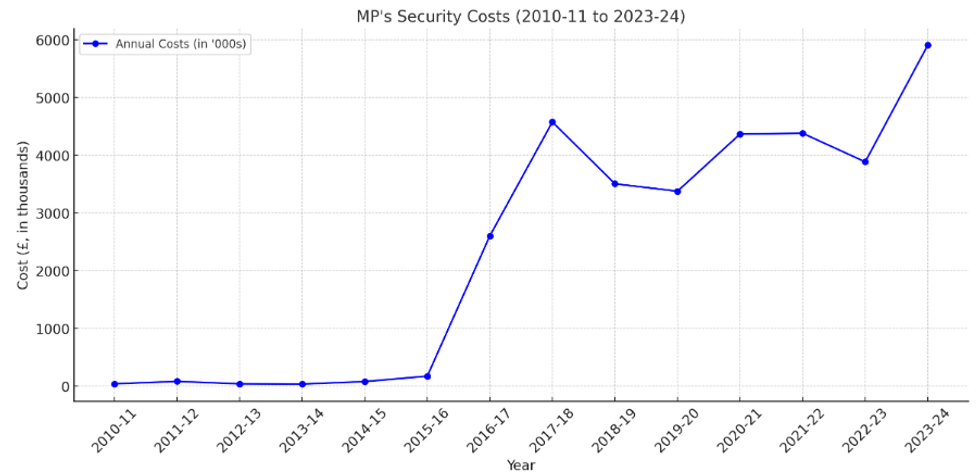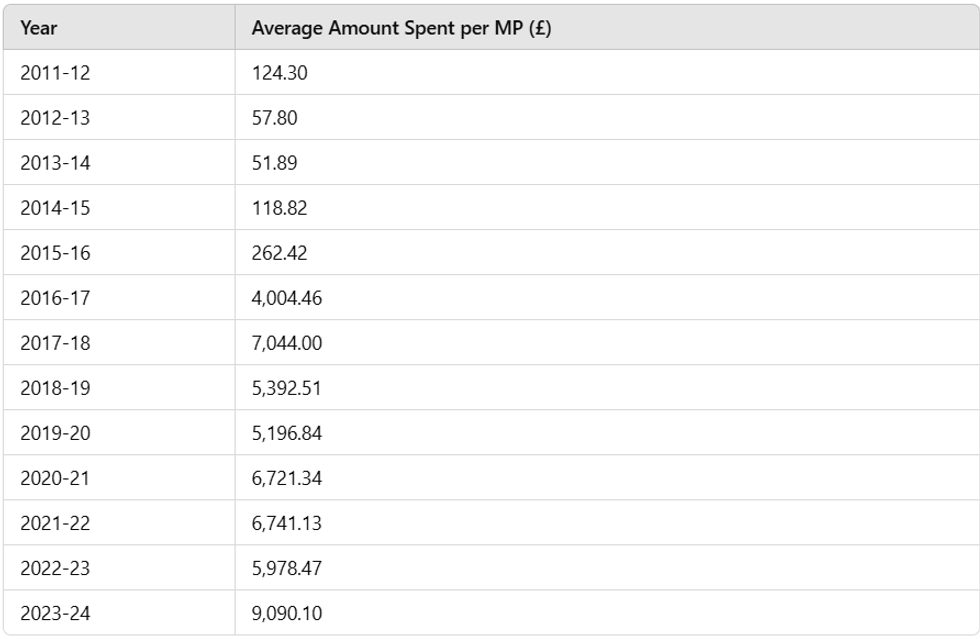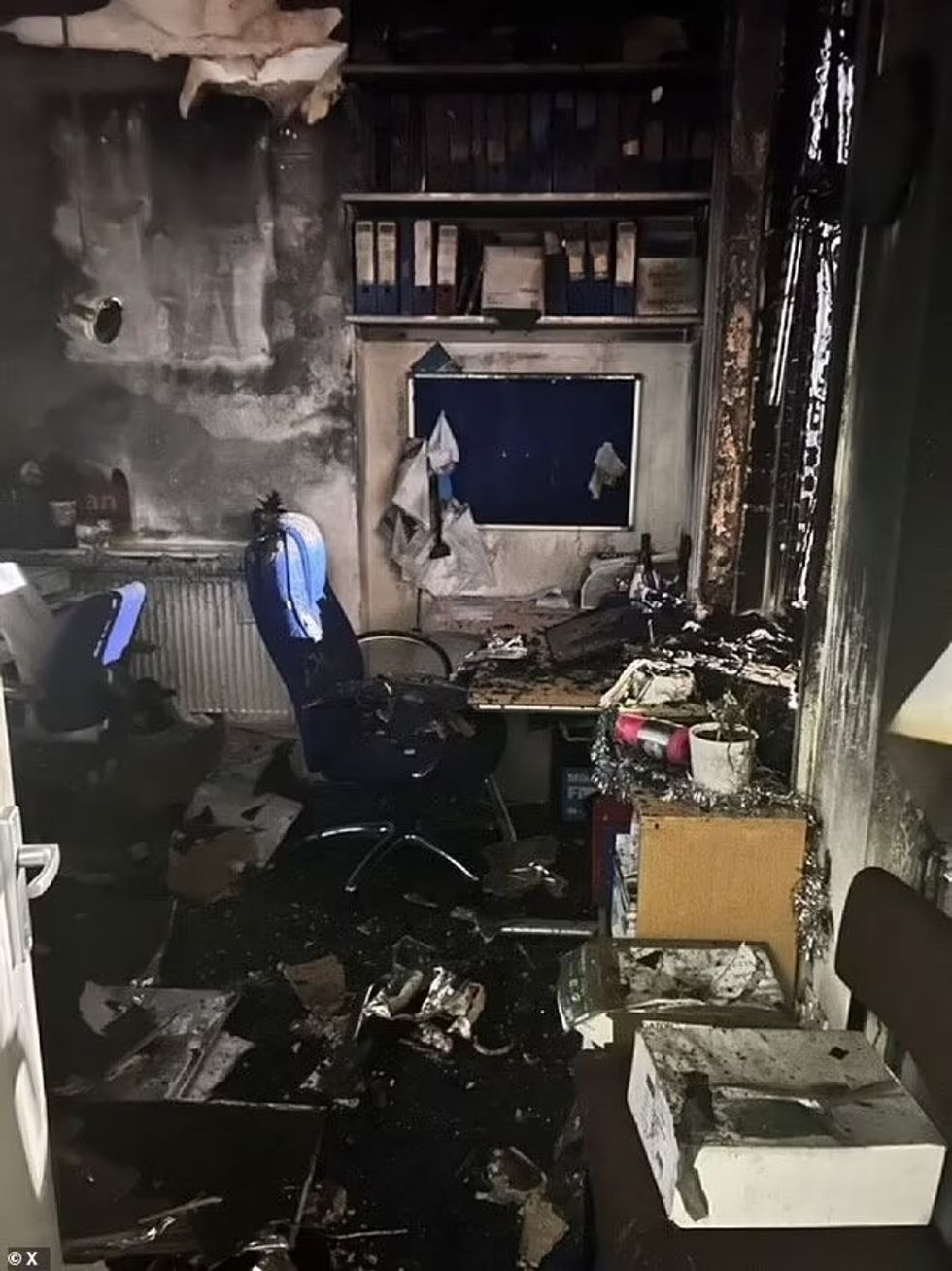MPs’ security costs have risen 15,000 per cent since the early 2010’s with a record £5.9million spent keeping MPs safe in 2023/24, GB News can exclusively reveal.
The dramatic rise in costs comes in response to increasing levels of threats, abuse and intimidation of MPs in public life, not to mention the murders of MPs Jo Cox and Sir David Amess.

MPs’ security costs 2010-2024
GB News
The data, obtained from the Independent Parliamentary Standards Authority (IPSA) and the House of Commons, revealed that MPs’ security costs averaged £53,428 per year between 2010 to 2016.
In the following five years (2016 to 2021), the average spend rose to £3.6 million per year.
That means from 2010 to 2016, roughly £82 was spent on security per MP each year, compared with £5,500 per MP each year from 2016 to 2021.
GB News’ FoI revealed the yearly figure for MPs’ security costs has now risen to a record £5.9million, meaning £9,076 was spent on security per MP last year.
This is a full 170 times more than the same figure for 2013/14.

Average amount spent per MP on security, 2010-2024
GB News
The staggering rise in the cost of MPs’ security comes as levels of threats, abuse and intimidation continues to increase.
While objective UK wide data is difficult to source, many MPs have reported receiving increasing amount of abuse and vitriol including death and rape threats.
This has resulted in some elected members installing panic buttons, security cameras and bombproof letterboxes.
Ethnic minorities, women, LGBTQ members and religious minorities are all more likely to face abuse, highlighting the damage the phenomenon is causing to our democracy as underrepresented groups turn away from seeking election.
After the election, it was reported some new MPs were finding it difficult to rent offices as landlords know they might be vandalised and damaged by disgruntled members of the public.
Mike Freer, the former Conservative MP for Finchley and Golders, stood down at the last election after his constituency office was subjected to an arson attack, for example.
Social media has largely been blamed for the rise in abuse and intimidation as highly secretive algorithms feed people more and more extreme content, repeatedly enforcing one point of view in what is called an ‘echo chamber’.
LATEST FROM MEMBERSHIP:
 Mike Freer’s constituency office was targeted in an arson attackMIKE FREER
Mike Freer’s constituency office was targeted in an arson attackMIKE FREERA BBC investigation in 2022 found 3,000 offensive tweets are sent to UK Members of Parliament every day.
This revelation comes after the government announced a £31million package of measures designed to boost MPs’ security as well as protect democratic processes more broadly in February 2024.
Measures included making sure elected members were assigned a contact in the police to discuss security with, as well as expanding security support.
On the dramatic increase in spending, Will Fletcher, interim CEO of the Jo Cox foundation, said: “Since the murder of Jo Cox in 2016, and subsequently of Sir David Amess in 2021, there has been a focus on the risks that MPs face.
“It is right and proper that the security measures available to MPs have been expanded over the past decade, as we better understand the risks and seek to ensure that they can remain safe while carrying out their duties.
“This has happened in a climate where the abuse, intimidation and threats faced by all elected representatives – including MPs – has grown steadily and represents a genuine threat to democracy.
“As a result, we are already seeing politicians stepping down, fewer people putting themselves forward as candidates, and less diversity and representation in UK politics.
“While it is important for additional security to be offered, we also need to focus on addressing the root causes of the abuse and intimidation of elected representatives, which is why we published 28 recommendations for tackling this in January 2024 and have since called for their adoption.”
A House of Commons spokesperson said: “The ability for Members and their staff to perform their Parliamentary duties safely, both on and off the estate, is fundamental to our democracy.
“We do not routinely comment on security matters, though there have been a number of significant changes in the approach to MPs’ security in recent years.
“As part of the comprehensive induction of MPs in the new Parliament, a full range of security advice and services has been provided to new and returning Members.
“Furthermore, the House has agreed to set up a Speaker’s Conference to consider the factors influencing the threat levels against candidates and MPs during the election period, and the effectiveness of the response to such threats.”